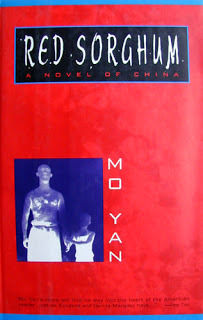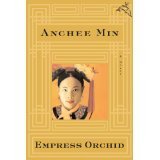RED SORGHUM
 This is a bold, brash, bawdy and brilliant work. Purporting to be a family chronicle that the narrator obtains from a 92 year old woman from his family village, it tells of his brave, lusty and larger than life grandparents and their turbulent existence carving out a life in the midst of a northern Chinese region infested with bandits, opium smokers and gamblers, and invaded by the Japanese. There are horrific scenes of brutality: second grandma (thereon hangs another tale) and young auntie were raped and mutilated, Uncle Arhat was skinned alive before being dismembered, Grandpa himself murdered Grandma's newly-wed husband and father-in-law (you simply have to read this book).
This is a bold, brash, bawdy and brilliant work. Purporting to be a family chronicle that the narrator obtains from a 92 year old woman from his family village, it tells of his brave, lusty and larger than life grandparents and their turbulent existence carving out a life in the midst of a northern Chinese region infested with bandits, opium smokers and gamblers, and invaded by the Japanese. There are horrific scenes of brutality: second grandma (thereon hangs another tale) and young auntie were raped and mutilated, Uncle Arhat was skinned alive before being dismembered, Grandpa himself murdered Grandma's newly-wed husband and father-in-law (you simply have to read this book).The author paints his scenes in vivid language: the red sorghum of the title itself refers to the hardy grain that shimmered in fields like a "sea of blood"; dancing, it "reeked of glory; cold and graceful, it promised enchantment; passionate and loving, it was tumultuous." The narrator felt a pang on a return visit, finding the fields planted with a hybrid variety of sorghum that never seemed to ripen (guaranteed to cause constipation); he was haunted by "a nagging sense of our species' regression."
Though Grandma died in the main battle told, that of the Black Water River with several bands of Chinese ill-coordinated against the Japanese, she was the heroine--lovely as foot-binding had reduced her feet to three inch "lotuses" so that when she walked, "her body swayed like a willow in the wind," and as opium-smoking short of addiction had given her "the complexion of a peach, a sunny disposition and a clear mind." She died unafraid but unwillingly; unafraid of the eighteen levels of Hell that everyone knew about but unwilling to let go of life.
The novel covers much more--a digression into the marauding packs of dogs almost has the dogs taking on the voice of the narrator; a survivor of the war who lives on into the middle of the 20th century, Old Eighteen Stabs Geng who lived despite those wounds because of the magical ministrations of a silver fox, succumbs to starvation when his pension is held up by a petty bureaucrat.
Should the author have put more energy into decrying such evil? This reviewer will not judge, only saying this--that it would have been criminal not to have written this book or to have published it. Yes, the story line is not chronologically straightforward and often jerks like the handheld videocams of journalists embedded in some war. So what? The Nobel was well earned.
For some context, I read Red Sorghum just after reading Anchee Min's Empress Orchid about which I wrote (in a review posted on Amazon.com):
 This novel about the last Empress Dowager of China as a young concubine in the late Qing dynasty is smoothly told. She pays attention to palace politics and learns about the wider world though her eunuchs, the emperor she serves and his half brother. When she bears the Emperor a son, she is elevated to the position of Empress, only she has to share that position as there is already one. But never mind, it happens to be her best friend among occupants of the harem.
This novel about the last Empress Dowager of China as a young concubine in the late Qing dynasty is smoothly told. She pays attention to palace politics and learns about the wider world though her eunuchs, the emperor she serves and his half brother. When she bears the Emperor a son, she is elevated to the position of Empress, only she has to share that position as there is already one. But never mind, it happens to be her best friend among occupants of the harem. Orchid must also face down and defeat the dying Emperor's most powerful advisor. (One does not learn why he chose to make an enemy of her.) China's humiliation at the hands of the barbarians penetrates into the harem somehow and Orchid chooses to support the uncle of her son the next Emperor. Throughout the book, the prose is smooth and chaste, bloodless, even when people died. An interesting read.
As Maureen Dowd complained after an editorial colleague at the New York Times won the Nobel Prize (for Economics) this is hardly a fair comparison. It is not. Some people love Goya's paintings, especially those he did of Spanish royalty. There is an air, a style about them. But it is difficult to pay heed when there is a Guernica in the same room.
Published on January 02, 2013 17:43
No comments have been added yet.



